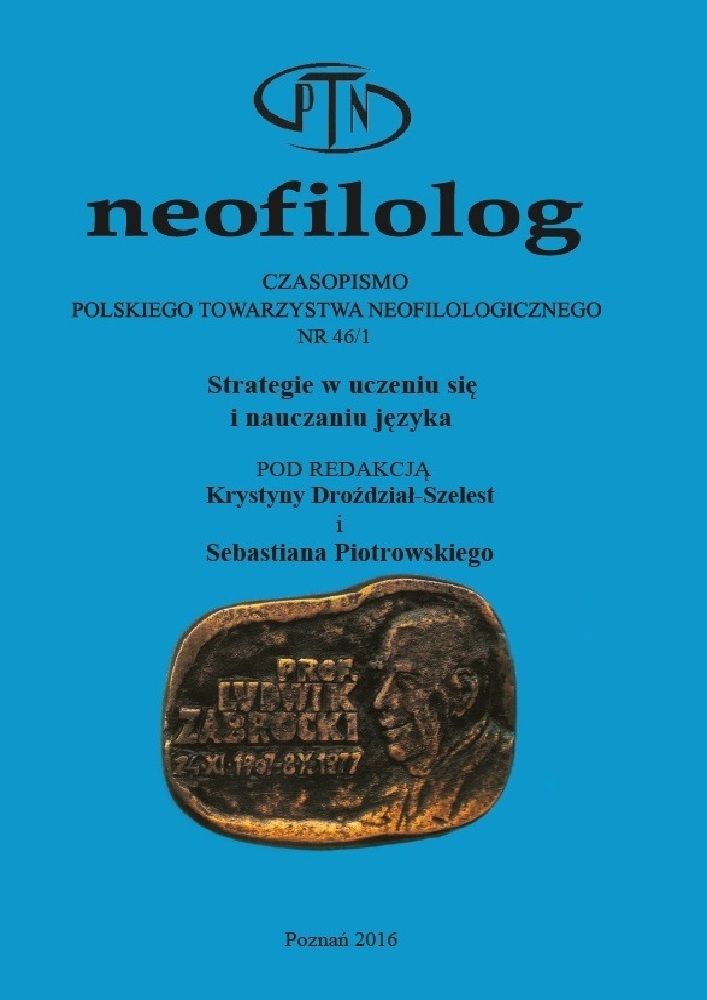Abstract
This article is about a task which required learners to reformulate a story which they had listened to in writing. In the context of foreign language learning, the original text provides a discourse model, whereas the way it is rephrased reflects students’ skill to use the new information in their own words. Retelling can also be treated as language practice focused on learning and practising new vocabulary and sentence structures. The re-search concentrated on fragments of text that were an extension of the original text that was retold by an elementary group of students of French philology (A2 level according to The Common European Frame-work of Reference for Languages, 2003) in Polish and French (the for-eign language). Comparison of speech produced in the two languages made it possible to consider the nature and function of the learners’ dis-course competence which, depending on the students’ personal goals and communicative experience, differed in the two cases. The data col-lected can serve as a starting point for planning further steps to develop students’ metadiscoursal awareness with the use of the retelling of a sto-ry as a learning strategy.References
Bartning, I. i Kirchmeyer, N. 2003. “Le développement de la compétence textuelle à travers les stades acquisitionnels en français L2”. AILE 19: 9-39.
Bronckart, J.-P. 1996. “L’acquisition des discours. Le point de vue de l’interactionnisme socio-discursif”. Le Français dans le Monde. Le discours: enjeux et perspectives. No spécial: 55-64.
Bronckart, J.-P. 2008. “Du texte à la langue, et retour: notes pour une “reconfiguration” de la didactique du français”. Pratiques 137-138: 97-116.
Canut, E. i Vertalier, M. 2010. “Etudier la complexité syntaxique chez l’enfant de moins de six ans dans une perspective interactionnelle: choix d’une méthodologie qua-litative” (w) Interactions verbales et acquisition du langage (red. Bernicot, J., Venziano, E. i Musiol, M.). Paryż: L’Harmattan: 239-260.
Europejski System Opisu Kształcenia Językowego: Uczenie się, Nauczanie, Ocenianie. 2003. Warszawa: Wydawnictwa CODN.
Karpińska-Szaj, K. 2015. “Przygotowanie do pracy z uczniami o specjalnych potrzebach edukacyjnych: językowe narzędzia diagnostyczne w praktyce nauczycielskiej”. Neofilolog 45/2: 187-202.
Karpińska-Szaj K. i Paprocka-Piotrowska, U. 2014. “La reformulation en tant que straté-gie d’apprentissage d’une LE: vers son exploitation dans des situations non-ordinaires”. Roczniki Humanistyczne LXII/10 Glottodydaktyka: 55-82.
Karpińska-Szaj, K. i Wojciechowska, B. 2015. “La performance morphosyntaxique dans les tâches de reformulation écrite. Cas d’étudiants débutants de FLE”. Neofilolog 44/1: 73-90.
Martinot, C. 2012. “De la reformulation en langue naturelle, vers son exploitation pé-dagogique en langue étrangère: pour une optimisation des stratégies d’apprentissage” (w) Autour de la compétence d’apprentissage de langues: ges-tion des ressources métacognitives et cognitives. (red. Karpińska-Szaj, K. i Zając, J.). Synergies-Pologne 9: 63-76.
Préneron, C. i Martinot, C. (red.). 2013. “Récits d’enfants et d’adolescents : développe-ment typiques, atypiques, dysfonctionnements”. Approche neuropsychologique des apprentissages chez l’enfant N°124/ volume 25/ tome III: 233-348.
Py, B. 1996. “Les données et leur rôle dans l’acquisition d’une langue non maternelle” (w) La construction interactive des discours de la classe de langue. Les carnets du Cediscor. Paris: Presses de la Sorbonne Nouvelle: 95-110.
Véronique, D. 2005. “Les interrelations entre la recherche sur l’acquisition du français langue étrangère et la didactique du français langue étrangère. Quelques pistes de travail”. AILE 23: 9-41.
License
Copyright (c) 2018 Katarzyna Karpińska-Szaj, Berbadeta Wojciechowska

This work is licensed under a Creative Commons Attribution-NoDerivatives 4.0 International License.
Authors
Authors of texts accepted for publication in Neofilolog are required to complete, sign and return to the Editorial team’s office the Agreement for granting a royalty-free license to works with a commitment to grant a CC sub-license.
Under the agreement, the authors of the texts published in Neofilolog grant Adam Mickiewicz University in Poznań a non-exclusive, royalty-free license and authorize the use of Attribution-NoDerivatives 4.0 International (CC BY-ND 4.0) Creative Commons sub-license.
The authors retain the right to the free disposal of the work.
Users
Interested Internet users are entitled to use works that have been published in Neofilolog since 2017, under the following conditions:
▪ attribution – obligation to provide, together with the distributed work, information about the authorship, title, source (link to the original work, DOI) and the license itself.
▪ no derivatives – the work must be preserved in its original form. Without the author's consent, it is not possible to distribute the modified work in the form of translations, publications, etc.
Copyrights are reserved for all texts published since 2017.
Miscellaneous
Adam Mickiewicz University in Poznań retains the property right as a whole (layout, graphic form, title, cover design, logo etc.).
